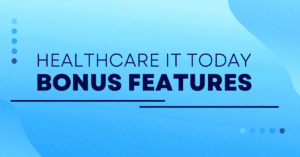The OpenNotes Lab will bring transparency, collaboration, and innovation to the intersection of healthcare AI and patient-centered care. The Lab builds on the organization’s 15 years of advocacy and research.
Healthcare IT Today had the opportunity to sit down with Liz Salmi, Communications & Patient Initiatives Director at OpenNotes and Chethan Sarabu, MD, FAMIA, FAAP – Clinical Assistant Professor at Stanford University School of Medicine to learn more about OpenNotes and OpenNotes Lab.
A Win for Patient Transparency
For the past 15 years, the team at OpenNotes has been advocating for greater transparency in healthcare. They used research and education to demonstrate the value of sharing medical information with patients. They were the champions of open access to doctor’s notes for patients and worked tirelessly to share stories from healthcare organizations who had successfully implemented an open approach to notes.
The 21st Century Cures Act (Cures Act) and ONC’s 2020 Cures Act Final Rule made sharing electronic health information the default for healthcare. This is what OpenNotes has been working towards and with this “victory”, the organization is now turning their attention to new areas.
Patient Centered AI
“Through the Lab we’ll work closely with the developers of clinical documentation technologies and investigate new avenues for translating our extensive experience into processes that help patients and clinicians alike,” said Catherine M. DesRoches, DrPH, Executive Director of OpenNotes at Beth Israel Deaconess Medical Center (BIDMC), in a press release.
“We realized there is more to do,” said Salmi. “With Open Notes Lab we will be looking at the intersection of generative AI and patients.”
The idea behind the Lab is to apply all of OpenNote’s expertise in research, advocacy, and innovation to an emerging area of healthcare – an area that remains murky and where bias could potentially derail benefits to clinicians as well as patients.
“Addressing algorithmic bias and its implications in research and health equity is of paramount importance,” said John Halamka, MD, President of the Mayo Clinic Platform and advisor to the OpenNotes Lab in the press release. “In my 40 year healthcare IT career, I’ve witnessed firsthand the impact of open notes. OpenNotes’ wide experience and rigorous approach to inquiry will facilitate unique collaborations among patients, clinicians and technology partners in meaningful ways.
Working with Innovators
The Lab also represents a new direction for OpenNotes collaboration. In the past the organization has shied away from partnering with companies so that they could remain impartial and avoid conflicts of interest. Through the Lab, OpenNotes will now work with select industry partners.
“We are in a very exciting new era with generative AI,” said Sarabu. “We have an opportunity to avoid what happened with EHR technology which led to frustration for clinicians and patients. With generative AI, we can work to make it more seamless.”
Sarabu pointed to ambient clinical voice as an example of how AI can be implemented in a way that makes care more patient-centered and more streamlined for clinicians. The Lab will be exploring that in more detail and producing more studies, guidelines, and education that the industry can leverage.
The Lab may even co-develop solutions with patient and vendor partners.
Watch the interview with Liz Salmi and Dr. Chethan Sarabu to learn more.
Learn more about OpenNotes at https://www.opennotes.org/
Listen and subscribe to the Healthcare IT Today Interviews Podcast to hear all the latest insights from experts in healthcare IT.
And for an exclusive look at our top stories, subscribe to our newsletter and YouTube.
Tell us what you think. Contact us here or on Twitter at @hcitoday. And if you’re interested in advertising with us, check out our various advertising packages and request our Media Kit.
Get Fresh Healthcare & IT Stories Delivered Daily
Join thousands of your healthcare & HealthIT peers who subscribe to our daily newsletter.




